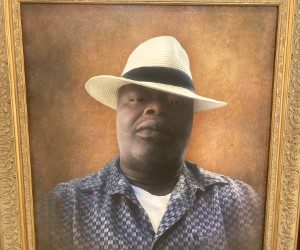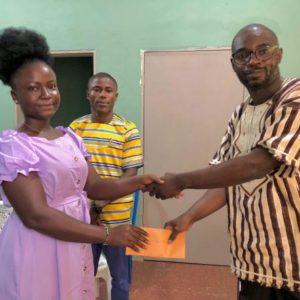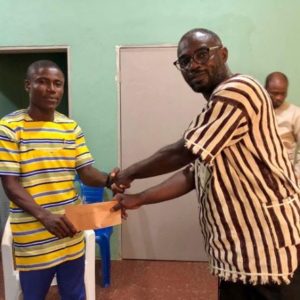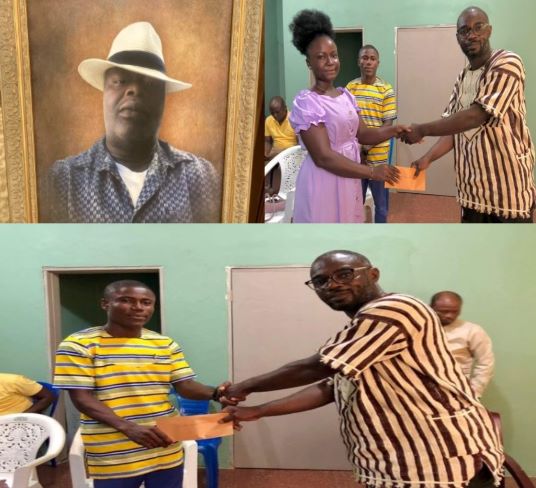PHOTO: Late Journalist Joe Teh (upper left) and Dr. Sam Wai Johnson presenting the scholarship package to the latest recipients, Ms. Deddeh Dellyn Sammy & Mr. Chuckey Radamel
By formally launching the JOSEPH WESSEH TEH MEMORIAL SCHOLARSHIP, an impressive event which was held on the Capitol Hill campus of the University of Liberia on June 20, 2022, the leadership and entire membership of the Association of Liberian Journalists in the Americas (ALJA) have prudently immortalized the memories of Mr. Teh in the annals of history.

The late Joseph Wesseh Teh, his passion for journalistic excellence has been immortalized.
From now on, when recipients of the scholarship are graduating, or when new scholars are being announced, Mr. Teh’s name would frequently be mentioned and future generations of journalists will henceforth be aware that once upon a time, there was an eminent Liberian journalist—a reporter, an editor, a columnist—who strongly believed that members of the Inky Fraternity should never quit in striving for excellence at all times.
During the funeral of Mr. Teh on March 4, 2022 in Springfield, Massachusetts, the President of ALJA, Mr. Joe Mason, while extolling the passion and commitment of our fallen colleague to the advancement of Liberian journalism, had announced at the time that his administration would establish a scholarship program in the deceased’s memory.
However, little did some of us know at the time that such a scholarship initiative would come to fruition in less than four months after Mr. Teh’s passing. The fact that the Joe Teh scholarship is now a reality is not only an embodiment of how the Joe Mason administration appreciated the late Teh’s contributions to uplifting Liberian journalism, but is also indicative of how the administration tends to prioritize every commitment it makes.
To underscore the significance of the event, the incumbent Vice President of ALJA, Dr. Sam Wai Johnson, a gentleman who had worked with the late editor at two media outlets—first at The National newspaper and later at Star Radio–was in Monrovia to personally launch the program.

The Vice President of ALJA, Dr. Sam Wai Johnson (right) presenting a scholarship envelope to Ms. Deddeh D. Sammy, one of the recipients.
While presenting the scholarship package to the two initial recipients, Ms. Deddeh Dellyn Sammy and Mr. Chuckey Radamel Thomas, Dr. Johnson recalled that in one of his last conversations with Mr. Teh prior to his death on February 17th this year, his former boss had pleaded with him to help Liberian journalists transition from the old conventional style of reporting to narrative journalism, noting that the late editor was very “passionate about the quality of our profession.”

Mr. Chuckey R. Thomas(left), the other young scholar also receives his envelope from Dr. Johnson at the launching ceremony.
There is no doubt that upgrading the standards of Liberian journalism was one of the foremost concerns of Joe Teh for decades. Whether it was in Sierra Leone, South Africa or at the Poynter Institute in St Petersburg, Florida, Joe Teh himself had prudently followed the adage which says “Charity begins at home”; he demonstrated his desire to seek advanced journalistic training at the aforementioned mentioned places, because he never felt complacent to stop learning. In his very last article regarding the need for improving the standards of Liberian journalism, which was published October 1, 2021 on the LIB-variety blogging site, he wrote an article under his To the Contrary column titled, Journalism Worldwide Has Evolved. Why Shouldn’t the Liberian Media?” Even though Mr. Teh had intended the publication of this article to precede the 2021 annual conference of ALJA, which was held in Trenton, New Jersey from September 23 to 26 last year, but because the webmaster was out of country and indisposed, it had to be published after the conference.
In that article, while highlighting the fanfare and socializing that would punctuate the convention such as the banquet, he observed, “However, my primary area of interest is the training offered at the convention.” Having clearly stated his area of interest, the veteran journalist, noted, “ALJA’s concerns over the state of the local media in Liberia are understandable”, adding, “Since ALJA came into being, journalism has evolved”.
And he continued, “ALJA members in the Diaspora have seen the growing use of technology in the dissemination of news information” and went on, “Also, the use of storytelling to report the news, which is more conversational than emphasizing ‘he said, he says, or she says or the press release added.”
Basically what our fallen colleague was saying is that Liberian journalists need not be complacent; like the rest of our counterparts around the world, we have to prepare ourselves and adapt to the fast-changing professional landscape catalyzed by technology in which we operate on a daily basis. The technological advancement of the 21st century demands that we commit ourselves to cultivating professional evolution and professional adaptation so that our services remain relevant to the need of society.
But going by the expose` of the two pioneering Joe Teh scholars-Deddeh Dellyn Sammy and Chuckey R. Thomas—one has reasons to believe that the future of Liberian journalism remains bright and promising. Before Dr. Johnson presented the scholarship package to the two young scholars, he briefly quoted from the optimistic sentiments expressed in their respective essays.
According to ALJA vice president, Ms. Sammy had written that her motivation for journalism is “To help the excluded, those who are left out of policy debates to be heard; to bring their voices to public policy debate”, adding, “Ordinary people deserve better to know what their leaders do with the trust they repose in them (the leaders).”
Also quoting from the other young scholar, Dr. Johnson disclosed that Mr. Thomas had written in his essay, “The media in Liberia need full professionals with strong academic backgrounds and good training to drive the profession.” Mr. Thomas, according to Dr. Johnson also expressed his conviction that “if journalists with sufficient education and training do drive the profession, public trust in the media will get stronger.”
It’s such challenge—the challenge of earning the trust and confidence of the Liberian public that all Liberian journalists must aspire to, because trust ought to be earned, not merely received on a silver platter. Of course, to earn it, one must relentlessly strive for it. Deddeh Sammy and Chuckey Thomas, the first two Joseph Wesseh Teh scholars at the Communications and Media Studies department of the University of Liberia have ably thrown out the challenge to the older and younger generations of journalists and so, we must all summon our utmost to rise to the imperatives.

